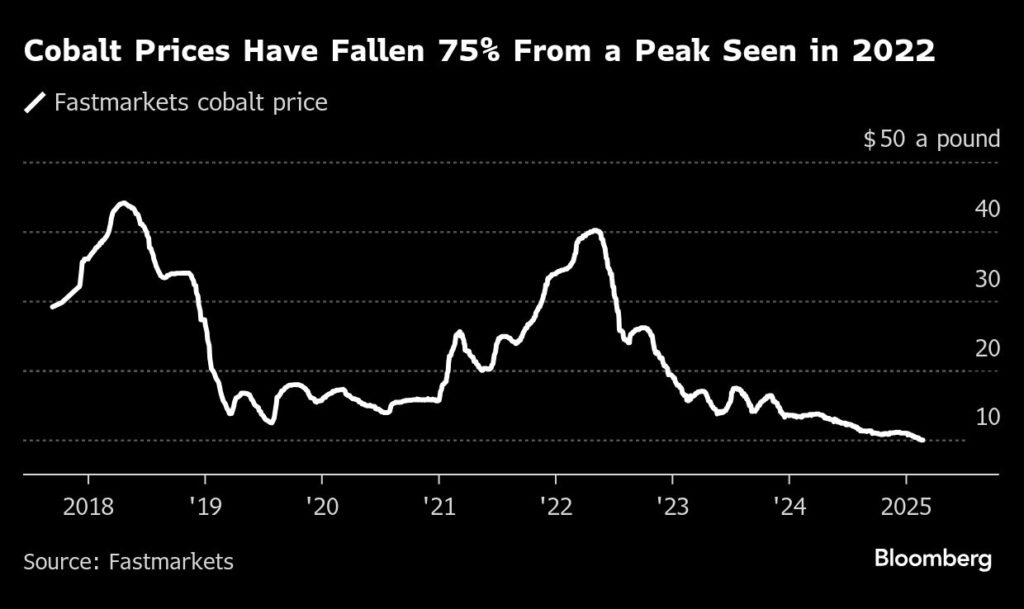Congo to enforce artisanal cobalt monopoly after export halt

Democratic Republic of Congo is starting to enforce a long-planned state monopoly to control production of hand-dug cobalt, broadening its efforts to boost prices for the battery metal by leveraging the country’s dominance over global supplies.
Entreprise Generale du Cobalt, or EGC, is now the only entity allowed to export so-called artisanal cobalt, according to new regulations signed by the prime minister and mines minister on Feb. 21. At the same time, the government also imposed a 4-month suspension on cobalt exports of any kind, in a move that could cause prices to skyrocket.
Taken together, the measures mark an unprecedented effort by the Central African nation to regain control of the cobalt market, after a surge in output at major industrial mines triggered a collapse in prices. Production of artisanal cobalt has plunged as margins plummeted, choking off a vital — but often dangerous — source of income for hundreds of thousands of people in Congo.
EGC is considering buying cobalt from artisanal miners during the suspension and stockpiling the material, “so that, for them, their activity isn’t impacted by this ban,” EGC chief executive officer Eric Kalala told Bloomberg by phone on Wednesday.
Once the temporary ban is lifted, independent processing facilities who normally buy from artisanal miners “may not export cobalt,” the Authority for the Regulation and Control of Strategic Mineral Substances’ Markets, known as ARECOMS, said on Monday. Their export licenses should be revoked “with immediate effect,” it said.
Instead, the facilities could partner with EGC to process cobalt and can continue to refine copper and other metals, EGC’s Kalala said. There are more than 20 such plants in southeastern Congo, he said.

EGC’s monopoly over cobalt dug by hand or semi-industrial means won’t affect large industrial miners active in Congo like Glencore Plc, CMOC Group Ltd. and Eurasian Resources Group Sarl. Those companies are responsible for most of the cobalt produced in the country, which accounts for about three-quarters of global supply.
CMOC’s soaring output from two large mines in Congo, where the mineral is extracted as a byproduct alongside copper, has caused supply to race ahead of demand and prices to tumble. The slump in prices has driven many of Congo’s artisanal miners to switch from cobalt to other minerals including gold and copper.
Specialist trading house Darton Commodities estimates that the weak market saw artisanal mining volumes drop to 4,400 tons to 5,000 tons in 2024 – or as little as 2% of the country’s total output. That compares to more than 21,000 tons in 2018 when prices hit an all-time high.
The largely informal industry provides livelihoods for hundreds of thousands of Congolese — and perhaps millions more indirectly — but is often criticized for dangerous working conditions and child labor.
EGC is the government’s attempt to address those issues to provide a reliable stream of clean cobalt, especially when prices are stronger.
EGC “exercises the exclusive right” to purchase and trade hand-dug metal, the new ministerial decree says. The state-owned firm can do this “directly or by means of partnerships or by delegating all or part of its activity to one or several other companies,” it said.
Industrial producers are now “strictly prohibited” from mixing their minerals with non-certified sources of artisanal cobalt, according to the regulations, which also allow companies to team up with EGC to open sections of their permits to artisanal mining without fear of punishment.
This could help remedy the common problem of artisanal miners breaking into industrial sites to steal ore, according to Kalala.
(By Michael J. Kavanagh and William Clowes)
Read More: Congo offers US, Europe minerals in exchange for peace
{{ commodity.name }}
{{ post.title }}
{{ post.date }}




Comments